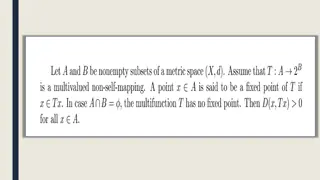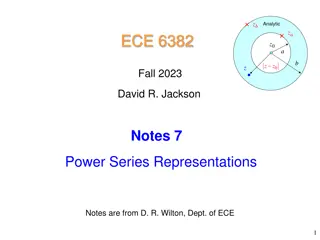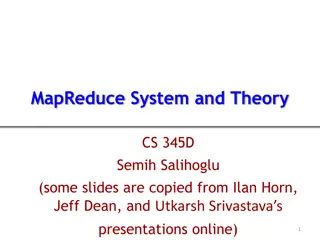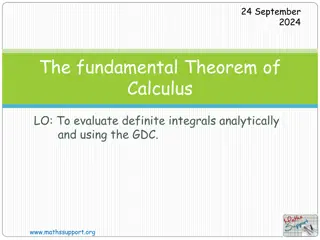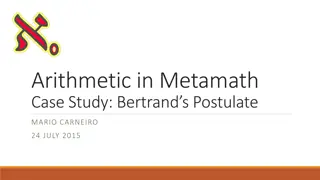Mathematical Foundations: Bounding Summations and Series
Explore the mathematical foundations of bounding summations, including the sum of first n natural numbers and geometric series. Learn about bounding each term of series, monotonically increasing and non-decreasing functions, and approximating summations by integrals. Dive into proofs, examples, and applications in computer science.
Download Presentation

Please find below an Image/Link to download the presentation.
The content on the website is provided AS IS for your information and personal use only. It may not be sold, licensed, or shared on other websites without obtaining consent from the author.If you encounter any issues during the download, it is possible that the publisher has removed the file from their server.
You are allowed to download the files provided on this website for personal or commercial use, subject to the condition that they are used lawfully. All files are the property of their respective owners.
The content on the website is provided AS IS for your information and personal use only. It may not be sold, licensed, or shared on other websites without obtaining consent from the author.
E N D
Presentation Transcript
Mathematical Foundations (Bounding Summations) Neelima Gupta Department of Computer Science University of Delhi ngupta@cs.du.ac.in people.du.ac.in/~ngupta
Sum of first n natural numbers n = k 1 k Where have we encountered this series? What does it add upto? 1) n(n+ ? 2 How do you prove it? By Induction
Geometric Series rk , r < 1 Where have we encountered such a series? Remember, median of medians? T(n) <= T(2n/10) + T(7n/10) + n What is it bounded by? Is it <= 2n? How do you prove it? By Induction
Bounding each term of Series n = k we have , ( ) k 1 k , n = k for all k, hence = n n ) ( n n 2 ( ) k = 1 1 k n n k = k = log( = = n ) ! (log ) (log ) log k n n n 1 1 In general : n n max i = = . where , { } a n a a a max max k i 1 = 1 k
Doesnt work always Example : = 2 3 x x x + + + + x e 1 .......... ! 1 ! 2 ! 3 r x = r = ! r 0 = 1 . max= . 1 a ( Here, Bounding each term by amax gives us Hence, for a tighter bound, we need other techniques
Monotonically Increasing Functions A function f is said to be monotonically increasing, if for all x and y such that x y one has f(x) < f(y), so f maintains the order. Thanks Swati Mittal Roll no. 45 (MCA 2012)
Monotonically Non- Decreasing Functions A function f is said to be monotonically non- decreasing, if for all x and y such that x y one has f(x) f(y). Thanks Swati Mittal Roll no. 45 (MCA 2012)
Approximating Summation By Integrals Let f(k) be a monotonically increasing function, we can approximate it by integrals as follows: n + 1 n n = k ( ) ( ) ( ) f x dx f k f x dx 1 m m m Lets prove this first! Thanks Swati Mittal Roll no. 45 (MCA 2012)
Y F( x) F(n-1) F(n) F(m+1) F(m) mm+ n- 1nn+ X m- 1 n-2 1 1m+ n + 1 n = k ( ) ( ) f k f x dx 2 m m Thanks Swati Mittal Roll no. 45 (MCA 2012)
Y F( x) F(n-1) F(n) F(m+1) mm+ F(m) n- 1nn+ X m- 1 n-2 1 1m+ 2 n n = k ( ) ( ) f x dx f k 1 m m Thanks Swati Mittal Roll no. 45 (MCA 2012)
Monotonically Decreasing Functions A function f is said to be monotonically decreasing, if for all x and y such that x y one has f(x) > f(y) , so f reverses the order. Thanks Swati Mittal Roll no. 45 (MCA 2012)
Monotonically Non- Increasing Functions A function f is said to be monotonically non- increasing, if for all x and y such that x y one has f(x) f(y). Thanks Swati Mittal Roll no. 45 (MCA 2012)
Let f(k) be a monotonically decreasing function prove: n + 1 n n = k ( ) ( ) ( ) f x dx f k f x dx 1 m m m Thanks Swati Mittal Roll no. 45 (MCA 2012)
PROOF + 1 n n n = x f(x) f(x) 1 f(x) = m m = x m x Lets Prove this inequality first Thanks to Swatantra Kumar Verma Roll no. 43 MCA 2012
F(m+1) F(m) F(n-1) F(n) n-1 n n+1 m-1 m m+1 Monotonically Decreasing Function Thanks to Swatantra Kumar Verma Roll no. 43 MCA 2012
+ 1 n n n = x f(x) f(x) 1 f(x) = m m = x m x Lets Prove this inequality Now Thanks to Swatantra Kumar Verma Roll no. 43 MCA 2012
F(m+1) F(m) F(n-1) F(n) n-1 n n+1 m-1 m m+1 Monotonically Decreasing Function Thanks to Swatantra Kumar Verma Roll no. 43 MCA 2012




